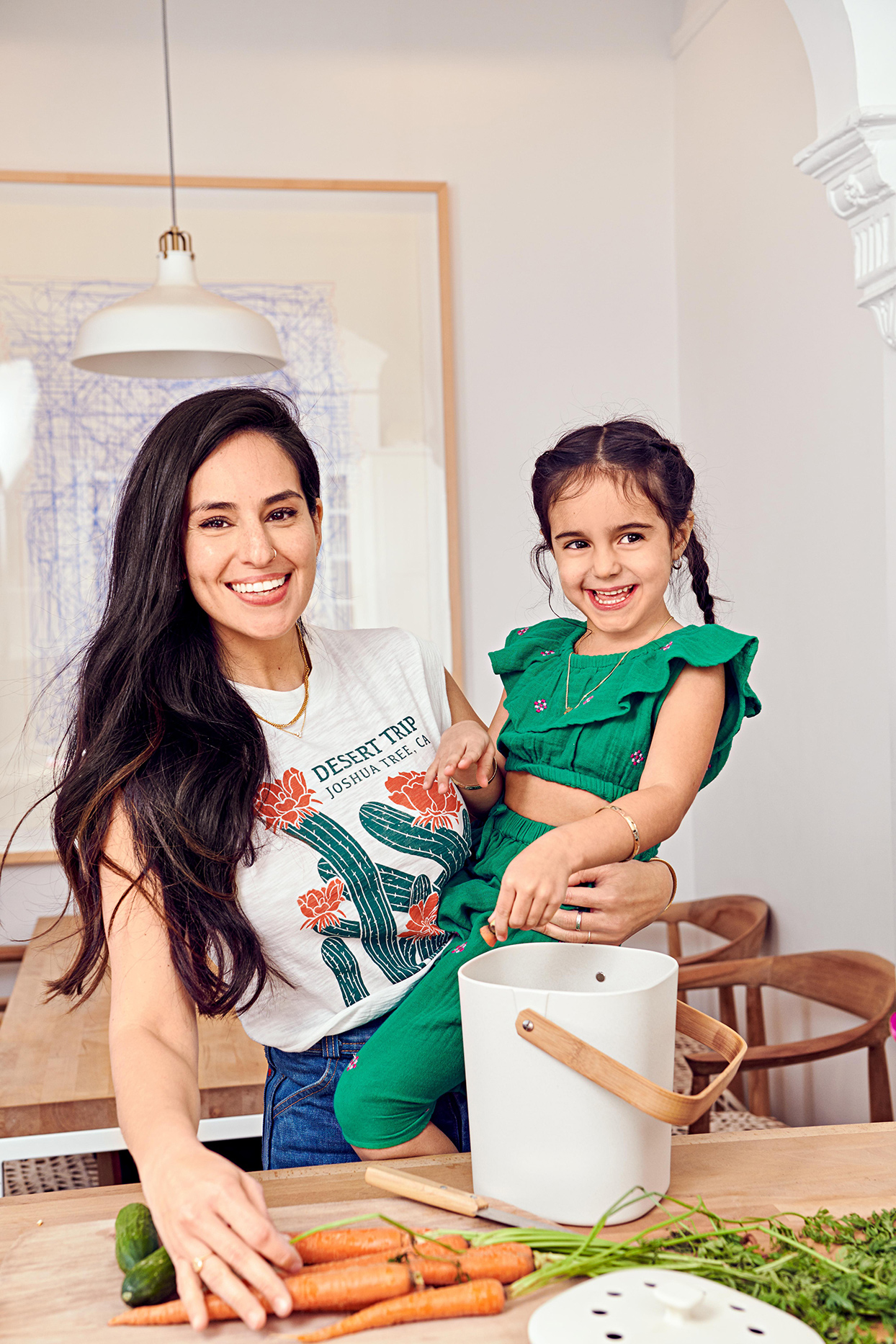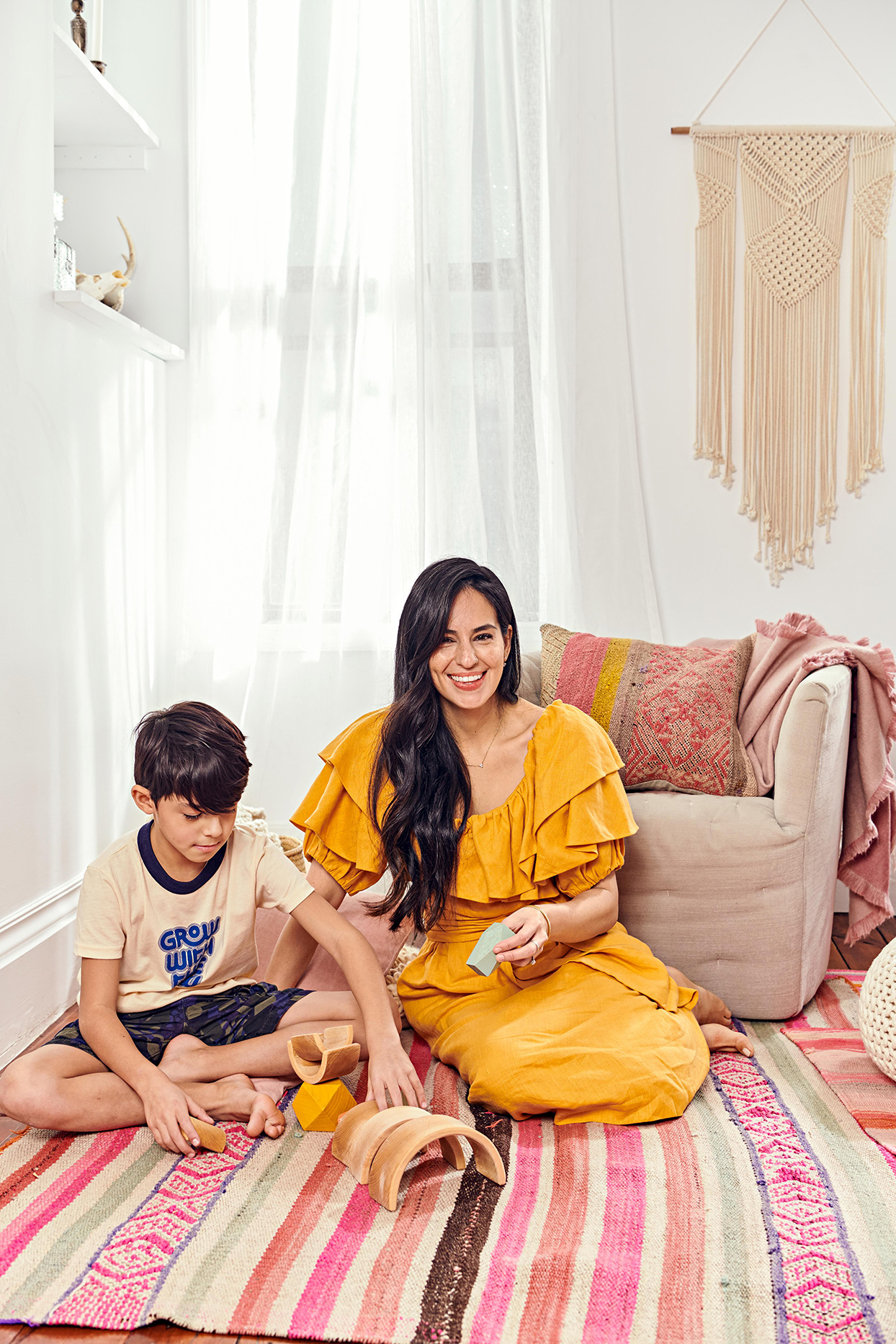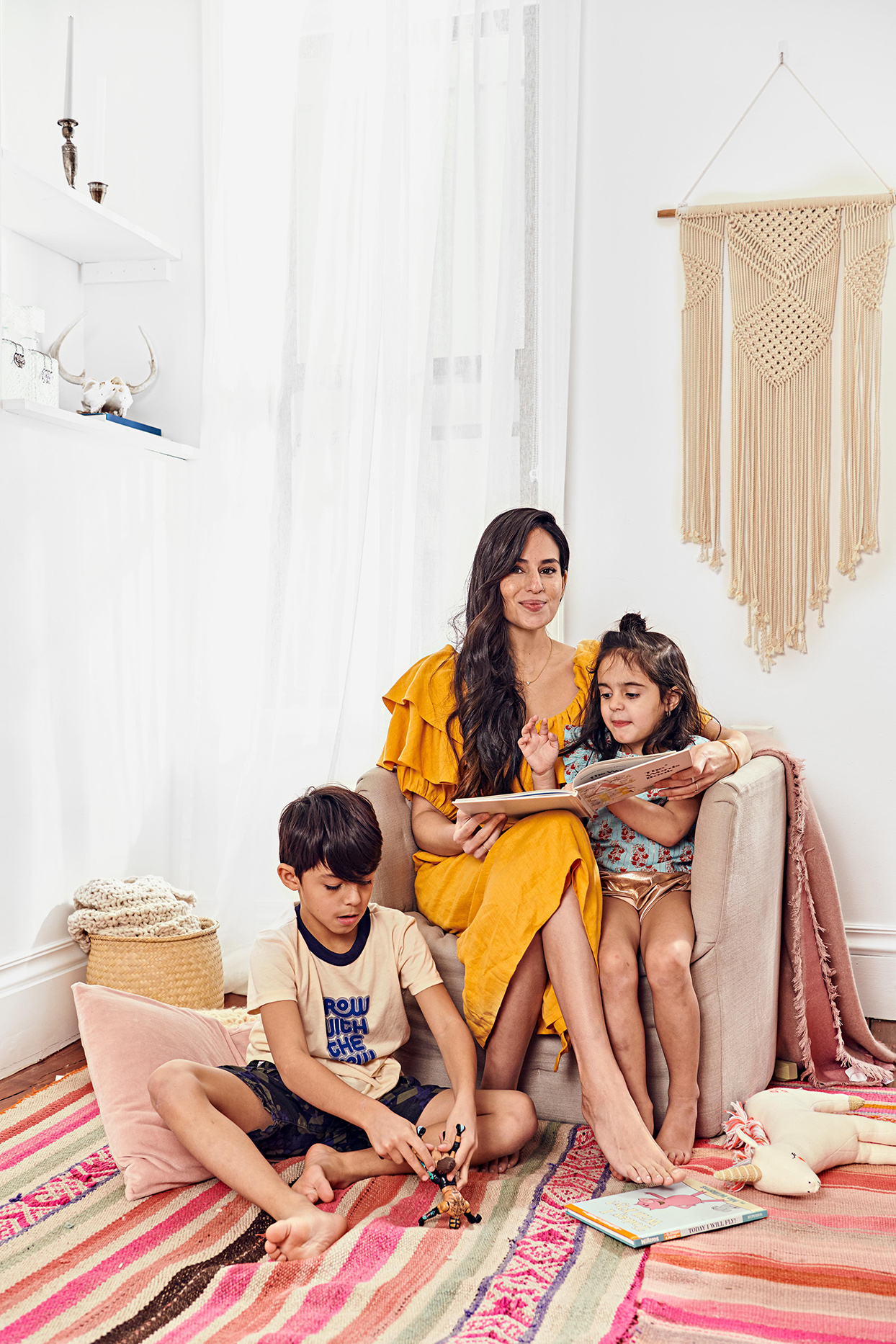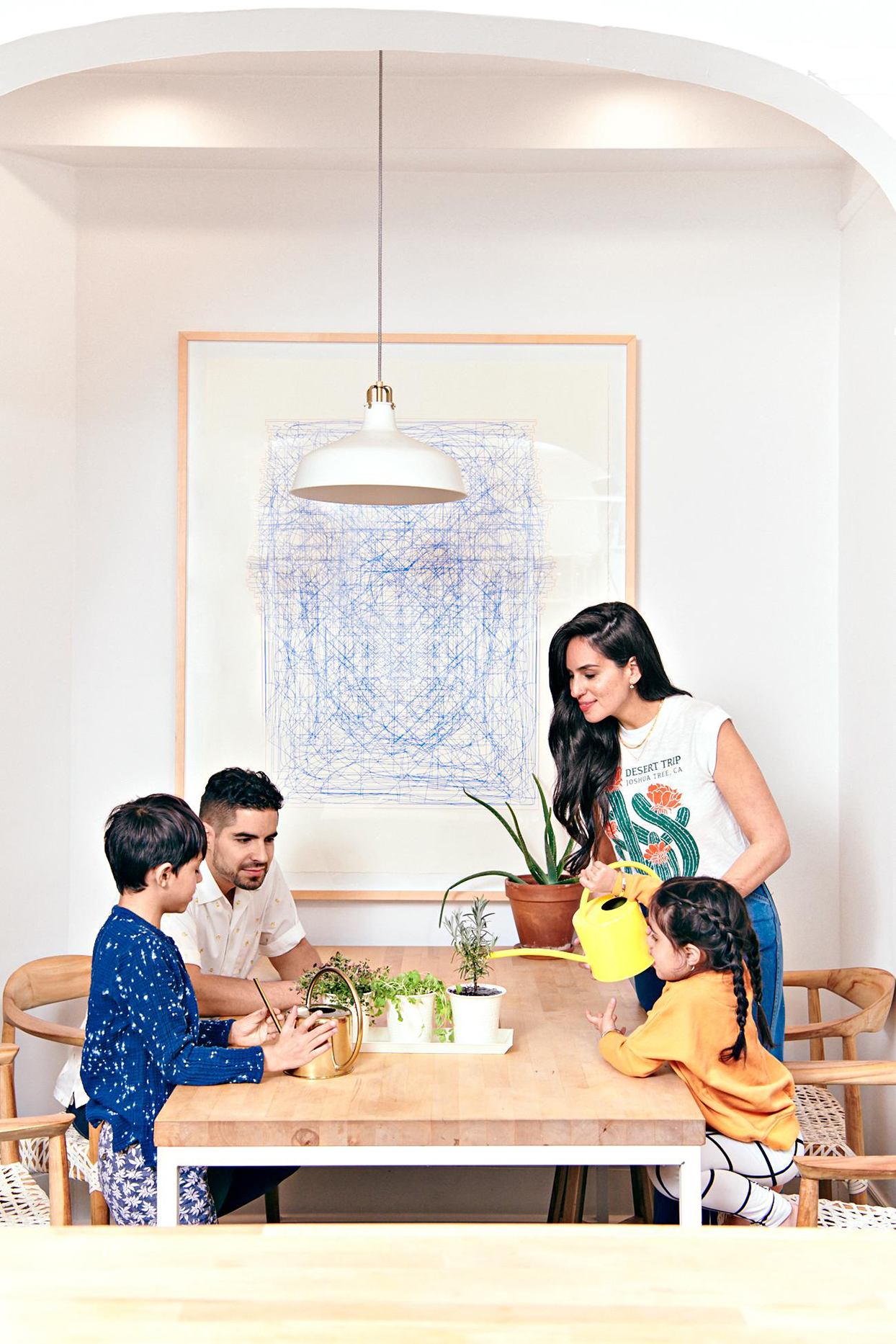
Over the past few years, Nicole Gonzalez and her fiancé, Ivan, have made it their mission to be more green. For Gonzalez, a Nuyorican blogger, it's a family affair. Her kids, Lucas León, 8, and Lillie Sol, 4, already know a whole lot about energy use, recycling, and conserving water. "I'm keenly aware of the future that I'm leaving them," she says.
Gonzalez isn't alone in making the planet a priority. According to a 2019 Kantar study, 61 percent of Latinos, more than any other ethnic group, consider themselves environmentalists. Still, like many parents, Gonzalez wonders what else she can do. "I'm all for changes," she says, "but I'm also juggling a lot as a mom."
While living sustainably takes time, planning, and creativity, it doesn't have to disrupt life completely, says expert Bea Johnson, the author of Zero Waste Home. Johnson, who has two college-age sons, produces just one pint-size jar of waste a year. "The key is to make realistic adjustments that eventually become a part of your routine," she says.
But where to start? We asked Johnson to weigh in on what Gonzalez is already doing and advise how she, and families everywhere, can reduce their impact on the environment.
Cut Off Your Plastic Supply
Gonzalez and her family have already made an effort to eliminate plastic. "We don't use straws, and we've switched to glass bottles and stainless steel containers," she says.
It's also important to look at what's happening outside the home, says Johnson. "If you're buying packaged goods at the supermarket," she explains, "you're still bringing in plastic." To remedy that:
Buy in bulk
Your local health-food or grocery store probably has a bulk-items aisle, with everything from cereal, nuts, and spices to shampoo and conditioner. You can also go to farmers' markets or use the ZeroWasteHome Web app to find 46,000 bulk spots.
BYO containers
Johnson takes three totes and five glass jars when shopping for wet food items such as deli meats and cheese. She fills cloth bags with dry goods like bakery staples. "If you buy things unpackaged, you stop waste at the moment of purchase," she says.
Have a little fun
Sustainable shopping will take some getting used to. So involve kids early to create a lasting change. When Johnson's sons were younger, she'd let them each pick any item from the bulk aisle. Eventually, they discovered new treats to replace the ones they used to buy.

Be Basic at Home
Green cleaning is one area Gonzalez relishes. She recently replaced paper towels with reusable ones. And she concocts her own cleaners from white vinegar and even fizzy toilet bombs out of baking soda. "It only takes a couple of minutes, and in the long run, it saves us money," says Gonzalez.
Johnson is all for creativity in going green, but only if it's something that you enjoy doing. "On Instagram, you see people posting homemade recipes for natural window or tile cleaner," she says. "But some of them involve as many as nine packaged ingredients!"
Rather than go to extremes, make these household tweaks:
Simplify cleaning
Gonzalez's use of white vinegar gets a big thumbs-up from Johnson, who employs the ingredient as a cleaner for everything. "Just mix it with water in a spray bottle," she says. Johnson also buys vegetable-based Castile soap in bulk and uses it for hands, the dishes, the floor—even to wash the dog.
Try a cloth alternative
Reusable towels are great, but a rag or washcloth will also do the trick, says Johnson. For those still big on tissues, good old-fashioned handkerchiefs work well. You can cut them out of an old T-shirt, or just check the drawers at grandma's house!
Swap that sponge
Your favorite kitchen assistant, which is most likely synthetic, isn't recyclable. That's why Johnson prefers a compostable wooden brush for dishes and a metal scourer for pots and pans.
Save food thoughtfully
Johnson's strategy for storing leftovers is easy—simply place them in a jar or transfer them to a bowl and cover with another plate.

Make Composting Work for You
When it comes to food waste, Gonzalez relies on reusable storage containers that keep perishables fresh longer. She also plans meals to minimize the amount of leftovers that get banished to the back of the fridge. "I want to try composting," says Gonzalez. "I'm just not sure of the best way to do it in a small city space." It's actually a lot easier than you'd think with these two options:
Get a compact composter
For less than $100, you can find a version that takes up the same amount of space as a small wastebasket. "I recommend one that uses worms to break down food scraps into soil amendments," says Johnson. "Not only does it work quickly, but it's a wonderful life cycle for kids to study." Best of all, you can use the rich dirt it produces to enrich the plants in your home or backyard. Many worm-composter options also have a tap at the bottom where liquid from the soil, aka "compost tea," is collected. "It works wonderfully as plant food when it's diluted with water," says Johnson. "Your garden will never look better!"
Visit a farmers\’ market
If the idea of worms in your home is a bit too much, many green markets accept compostable items, such as corn cobs, coffee grounds, and even pizza boxes. You can freeze any food scraps you don't want sitting around in your kitchen until your next drop-off.
Recycle Less
"My kids are pros at recycling," says Gonzalez. "They know what goes into which bin and will sometimes pick up litter they see on the street when walking to and from school."
If anything, though, Gonzalez could be doing less. "Recycling, honestly, is a pain," says Johnson. "Even if you put plastic in the right garbage container, you have no idea what's going to happen to it next." Reduce the amount of trash you produce in the first place by refusing what you don't need, especially:
Freebies
That prize at the end of a dentist appointment or the balloon at the street fair? "Teach kids to say no on the spot," says Johnson. "Explain that certain items are made to last just minutes, which will only lead to tears later."
Paper goods
At retail stores, don't accept shopping bags, tissue paper, or free gift wrap. And if the option is available, request an emailed receipt instead of a printed one.
Junk mail
For a $2 fee, you can go to dmachoice.thedma.org and remove your address from mailing lists—and put an end to catalogs, advertisements, and even credit-card offers for 10 years. You can also switch to paperless billing and banking and opt out of mail on individual retailer websites.
A Greener Way To Gift
For birthdays and special occasions, Gonzalez has done away with favors and goody bags. She also emails her kids' holiday wish lists to relatives ahead of time so that they don't go overboard buying toys. "We ask only for what the kids will absolutely love and use," says Gonzalez.
To cut back on waste even more, advises Johnson, focus on experiences over stuff. For example, your kid can give a friend who is celebrating a birthday "a visit to the café." "Let them sit at one table and order their own food and drinks," says Johnson. "And the moms can sit at a table far away so the kids can do their own thing." You can also arrange movie outings or museum trips as gifts. When Johnson runs out of ideas, she browses sites such as Groupon, Viator, and Airbnb Experiences for inspiration.
Shop Smart
Thrifting is an activity Gonzalez loves to do with her children. "I turn it into a scavenger hunt for them, especially with toys," she says. "If my son is missing a certain wrestler in his collection, we scour local stores for it."
Johnson, who hasn't bought new clothes since 2012, is also a big fan of going "vintage." But be sure to pay attention to:
Packaging
A great secondhand resource is eBay, since you can filter products there by "pre-owned." At checkout, Johnson always asks the seller to send the item in cardboard or paper, without any bubble wrap, packing peanuts, or any other hard-to-recycle shipping materials.
Warranties
You can mend most clothes and socks with a needle and thread. But many brands will actually take care of it for you, says Johnson. For example, JanSport will repair or replace backpacks that can't be fixed, under its lifetime warranty.

Save on Electricity
To conserve energy, Gonzalez air-dries laundry on racks. "We've also installed dimmers, and we use LED bulbs and turns off lights whenever we can," she says. "I wish we had solar panels, but that's not realistic in an apartment building we don't own." You don't have to make a drastic move, though, to minimize your energy use, says Johnson. Instead, she suggests the following tips:
Paint the walls white
Lighter shades decrease reliance on electricity. "When it rains and gets dark, my neighbors turn on the lights," says Johnson. "My family doesn't because our walls are so bright. It's had a huge impact on our energy bill."
Do more by hand
Try limiting your kitchen gadgets and donate anything you don't need. "For example, slice veggies without a chopper," says Johnson. "And repair things instead of trashing them at the first sign of trouble."
Work Around Long Showers
While Gonzalez is conscious about how much water her family uses when brushing their teeth or washing their hands, she still loves the occasional long shower.
Johnson concedes that you may find some changes hard to implement. ("For me, it's drying laundry indoors during winter—it drives me crazy to have clothes hanging in my living room and kitchen," she says.) But there are two tricks you can employ to get the most out of bathtime:
Set a timer
For little kids, make a game out of who can take the shortest shower.
Use a bucket
As you're waiting for water to warm up, collect it in a container underneath the faucet. You can then reuse it on plants or to flush the toilet.
Thanks, But No Thanks!
Even if you're making progress, loved ones can sometimes unintentionally thwart your efforts. When Johnson committed to going green, it took her relatives some getting used to. Her mother, in particular, continued to give her collectible antique linen sheets. Finally, Johnson put the gifts in a donation pile at home to show her mom she meant business. It worked. "While it's awkward to set boundaries, it's so worth it in the end," she says. "Once your family understands your rules, they'll learn to accept the way that you live."
This article originally appeared in Parents Latina's April/May 2020 issue as "Next Level Green."
Parents Latina

